In addition to asking Asian Americans about their experiences with specific discrimination incidents, we also wanted to understand their opinions of how Asians are treated in the U.S. today.
In the survey, we asked Asian adults about their views of anti-Asian discrimination and the attention paid to it. We also asked if they discussed challenges they might face because of their race or ethnicity with their families when growing up.
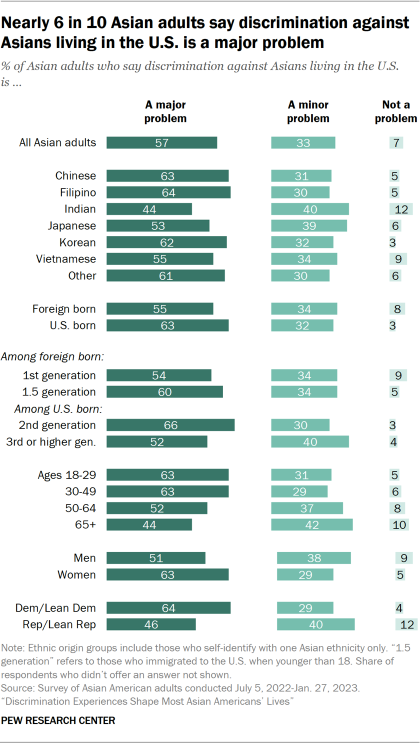
A majority of Asian adults (57%) say that discrimination against Asians in the U.S. is a major problem. One-third say it is a minor problem (33%), while 7% say it is not a problem.
Perspectives vary across demographic groups:
- Origin: About six-in-ten Filipino (64%), Chinese (63%) and Korean (62%) adults, as well as adults who belong to less populous origin groups (61%) – those categorized as “other” in this report – say discrimination against Asians is a major problem. A smaller share of Indian adults (44%) say the same.
- Nativity: 63% of U.S.-born Asian adults say anti-Asian discrimination is a major problem, a higher share than among Asian immigrants (55%).
- Immigrant generation: 66% of second-generation Asian adults – the U.S.-born children of immigrant parents – say discrimination against Asians in the U.S. is a major problem. By comparison, 60% of those who immigrated to the U.S. as children (1.5 generation), 54% who immigrated as adults (first generation), and 52% of third- or higher-generation Asian adults say the same.
- Age: 63% of Asian adults under 50 say discrimination against U.S. Asians is a major problem, compared with 44% of those 65 and older.
- Party: 64% of Asian Democrats or Democrat leaners say anti-Asian discrimination is a major problem, compared with 46% of Asian Republicans or Republican leaners.
- Gender: Asian women are more likely than men to say discrimination against Asians is a major problem (63% vs. 51%). Men are more likely than women to say it’s a minor problem (38% vs. 29%) or not a problem (9% vs. 5%).
Experiences with talking about racial discrimination while growing up
Among Asian adults who grew up in the U.S., 38% say their family never talked about the challenges they might face because of their race or ethnicity when growing up.20 Another 30% say their family rarely talked about it, while 22% say they sometimes discussed it and only 8% say they often discussed it.21
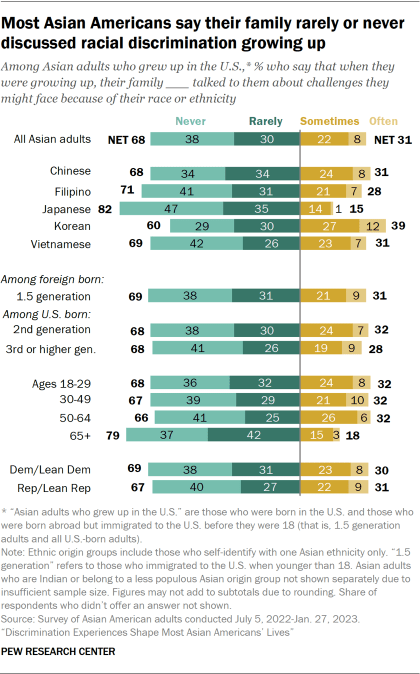
These findings are largely consistent across demographic groups of Asian Americans. However, there are some differences among those who grew up in the U.S.:
- Ethnic origin: 82% of Japanese adults say they rarely or never talked about racial discrimination with their family growing up. This includes 47% who say they never talked it. Among other origin groups, smaller majorities say they rarely or never discussed these challenges.
- Age: 79% of Asian adults 65 and older say they rarely or never discussed the challenges they might face due to their race or ethnicity. In comparison, about two-thirds of Asian adults in younger age groups say the same.
Is enough attention being paid to anti-Asian racism in the U.S.?
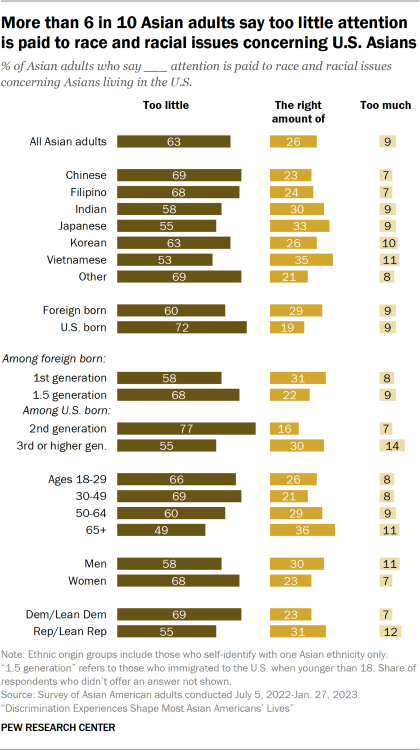
About six-in-ten Asian adults (63%) say too little attention is paid to race and racial issues concerning Asians living in the U.S. About a quarter (26%) say the right amount of attention is being paid to it, while 9% say it is getting too much attention.
Asian Americans’ views on attention to racial issues concerning Asians in the U.S. vary across demographic groups:
- Ethnic origin: About seven-in-ten Chinese (69%) and Filipino (68%) adults, as well as adults who belong to less populous origin groups (69%) say too little attention is paid to race and racial issues about Asians in the U.S. Somewhat smaller shares of Indian (58%), Japanese (55%) and Vietnamese (53%) adults say the same.
- Immigrant generation: 77% of second-generation Asian Americans say too little attention is being paid to it. By comparison, smaller shares of 1.5-generation (68%), first-generation (58%) and third- or higher-generation (55%) Asian adults say the same.
- Age: Older Asian adults are less likely to say that too little attention is currently being paid to racial issues concerning Asians in the U.S. About half of those 65 and older (49%) say this, compared with 66% of Asian adults under 30. Meanwhile, the oldest group of Asian adults are more likely than the youngest group to say the right amount of attention is being paid (36% vs. 26%).
- Gender: 68% of Asian women say too little attention is being paid to racial issues concerning Asians in the U.S., a higher share than among Asian men (58%).
- Party: Asian adults who identify with or lean to the Democratic Party are more likely than Asian Republicans to say too little attention is being paid to race and racial issues concerning Asian Americans (69% vs. 55%).
Asian Americans’ views of anti-Asian discrimination are linked to the connection they feel to other Asians in the U.S.
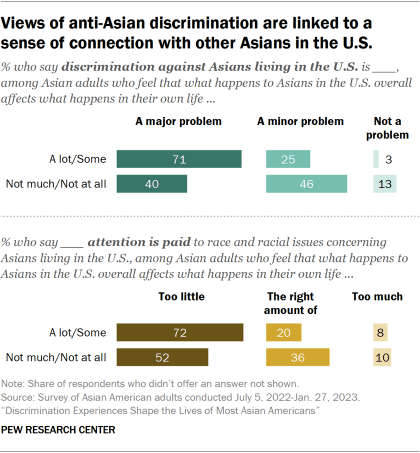
In the same survey, we asked Asian Americans to what extent they think that what happens to Asians in the U.S. affects what happens in their own life – in other words, the strength of the “linkage” they feel with other Asian Americans.
On whether Asian adults see discrimination against Asians in the U.S. as a problem:
- Those who feel a lot or some linkage with other Asian Americans are more likely to say anti-Asian discrimination is a major problem, compared with those who feel not much or no linkage at all (71% vs. 40%).
- Meanwhile, those who feel little linkage are more likely to say anti-Asian discrimination is a minor problem, compared with those who feel a lot or some linkage (46% vs. 25%).
There are also some differences over how much attention is being paid to race and racial issues concerning Asians in the U.S.:
- Those with stronger linkages to other U.S. Asians are more likely to say too little attention is being paid to race and racial issues concerning Asians in the U.S. (72% vs. 52%).
- Those with weaker linkages are more likely to say the right amount of attention is being paid (36% vs. 20%).
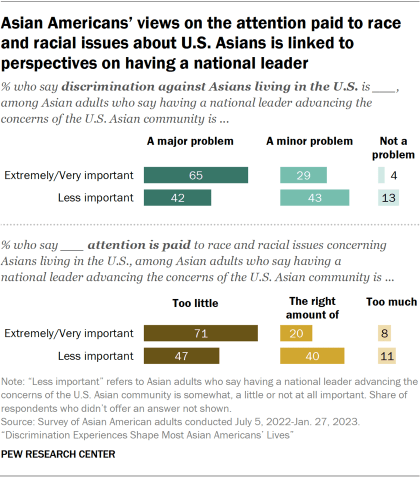
Additionally, we asked Asian adults whether they think it is important for the U.S. Asian community to have a national leader advancing its concerns. Asian adults who feel it is important to have a national leader advancing Asian Americans’ concerns are:
- More than twice as likely to say discrimination against Asians in the U.S. is a major problem as they are to call it a minor problem (65% vs. 29%).
- More than three times as likely to say too little attention is being paid to race and racial issues concerning Asians in the U.S. as to say it’s getting the right amount of attention (71% vs. 20%).
Meanwhile, Asian adults who see having a national leader as less important are about evenly split in their views. Similar shares say discrimination against Asians is a major or minor problem (42% and 43%) and that too little or the right amount of attention is being paid to racial issues concerning Asians (47% and 40%).



